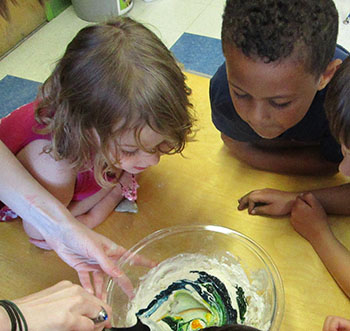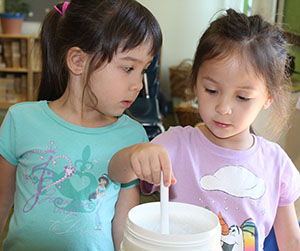Week 1
Because the Green Room children are a mix of children from other classes at the CYC and a handful of new children, this week was spent getting to know new friends and reaquainting with old. Children came up with rules that would apply for the summer by working with their parents to write a rule down and then compiling their ideas in a giant web. It turned out all of the rules could be put under the category of "Kindness" with sub-categories of myself, others, and the CYC. Each child's rule was read at the morning meeting and it was discussed where on the web it should be placed.
Water Table- Most days in the summer the water table is available as a center. The Green Room is fortunate to have access to an outside space just adjacent to the back door. Children gather around this table and many good conversations and negotiations are had. Two hand mixers were part of the materials available for the campers to use in the water table along with basters, cups, spoons, boats, and funnels. Toward the end of the week bubbles were added for the children to stir up.

Play dough-
This is a classroom staple and most kids love to work with it. Small groups came together and measured out the ingredients according to the recipe and stirred them together. Children took turns stirring by counting 20 stirs for each child before they passed it to the next . Campers chose the colors pink and green for the two batches made.Trail Mix-
Each week a cooking project is planned. In this simple mix children were able to count out 20 pieces of an array of small snack items. Trail mix is a classic mix where bits and pieces are still distinguishable and can be separated out. This activity will be a basis for when the children combine ingredients to make solutions which are mixtures that cannot easily be separated out. Children used child friendly chopsticks to pick up each piece of snack mix, exercising their fine motor skills. Words like "less than" and "more than", "I only took about 14" were heard.
Bubbles -
After reading a recipe on how to make bubbles, children gathered the supplies and proceeded measuring the 8 cups of water, 1/2 cup of dish soap, and 1 Tablespoon of glycerin. The object of mixing this solution was to keep from stirring up too many bubbles, so children carefully moved the spoon around to incorporate all of the ingredients.
To go along with the bubble solution, campers crafted their own bubble wands using pipe cleaners and beads. In the end it was thought the store bought wands worked better. An extra batch of bubble mix was prepared to sit and age for the following week according to the instructions in the book, How to Make Bubbles.

Mixing Compost -
One of the lunchtime routines children do is to clean up after lunch. Lunch trash gets sorted into a landfill can, a recycled container, and a bin to be composted. To learn about compost children were taught anything a worm can eat can be composted. Mrs. Wiest brought from her home compost pile some compost rich with worms. The campers started a compost worm farm of their own near the Green Room back door. The mixture for compost is anything organic or plant based, so children added leftover bits from their lunch to feed the worms. One child brought extra "worm food" from her home scraps!
